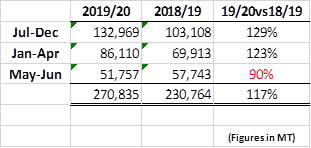ECX sales volumes are a fraction of what they were 12 months ago. If this trend continues the output for 20/21 is going to see a sharp decline vs 19/20, which saw record exports as reported last week. Below we compare the ECX sales between the 23rd June and 21stJuly for 2020, 2019 and 2018; at present sales are greatly reduced, Washed coffee sales in the last month equate to 14% of the sales of Washed Coffee same period in 2019. Only 11 containers of Sidamo were sold! The picture in Naturals is better but still only 31% of the sales in 2019; even compared to 2018 the current year figures are pitiful! It is possible that the pace of sales picks up again but we believe that they will stay low.

Prices at ECX continue high, boosted by reduced availability. On the other hand, there still seem to be some parcels in the hands of shippers that were thought sold but have not been shipped as some buyers/roasters have asked for contract cancelations. So we have a mixed picture! However, it is a sad reality that this is a difficult year for the Ethiopia coffee industry. The weather has raved havoc, lower crop, and lower quality (mostly caused by difficulties in post-harvest drying in unseasonal wet conditions); unrest in parts of the Wellega region played a hand in poor handling during the post-harvest period. More recently more unrest and the current pandemic have not helped processing and logistics.
by Charles Seara Cardoso




